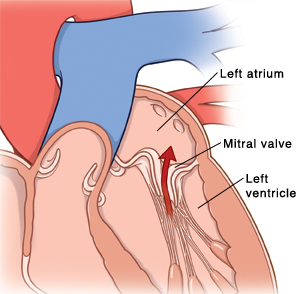The mitral valve is one of four valves in your heart. They open and close to control the flow of blood into and out of the heart. The mitral valve connects the left atrium to the left ventricle. Mitral valve prolapse means that the mitral valve is loose or floppy. This is often an inherited condition. It can also occur in the setting of other cardiac disease.
Most cases of mitral valve prolapse don’t cause any harm and have no symptoms. In other cases, symptoms may include:
-
Fast, pounding, or irregular heartbeat.
-
Chest pains.
-
Dizziness.
-
Fainting spells.
-
Shortness of breath.
-
Lack of ability to exercise.
Some people with mitral valve prolapse may have panic attacks, anxiety, or severe tiredness (fatigue). More serious symptoms are uncommon.
Treatment
Benign cases of mitral valve prolapse usually don’t need any special treatment or limits on activity.
People with palpitations or other symptoms may be treated with medicine. This is done to slow the heart rate, lower blood pressure, or treat heart rhythm problems.
Mitral valve prolapse with severe regurgitation may need surgery to fix or replace the valve.
General care
Adopt a heart-healthy lifestyle. Exercise regularly. Abstain from alcohol and caffeine. Don't smoke. If you smoke or use e-cigarettes, get help to quit.
Brush and floss your teeth regularly. This will keep your gums and teeth healthy. It will lower your risk for heart valve infection.
Tell your dentist or surgeon before you have any procedure done. Antibiotics are no longer needed before dental procedures for people with benign (harmless) mitral valve prolapse.
Follow-up care
Follow up with your health care provider, or as advised. You may need more tests.
Call 911
Call
-
You have chest pain that’s new.
-
Your chest pain gets worse or doesn’t go away with rest.
-
You have moderate or severe shortness of breath.
-
You have a fluttering, racing, or pounding heartbeat (palpitations) that lasts longer than 5 minutes, or is linked to other symptoms noted here.
-
You have fainting, severe or persistent dizzy spells, or lightheadedness.
-
You have weakness or numbness in an arm or leg, or on one side of the face.
-
You have trouble speaking or seeing.
When to contact your doctor
Contact your provider right away if:
-
Your ankle swells or you have mild shortness of breath.
-
You have mild fluttering, racing, or pounding heartbeat (palpitations) that doesn't last longer than 5 minutes and isn't linked to other symptoms.


